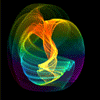The Goal as the Path - Discussion
The Goal as the Path

Jason Snyder, modified 9 Years ago at 10/2/14 12:34 AM
Created 9 Years ago at 10/2/14 12:30 AM
The Goal as the Path
Posts: 186 Join Date: 10/25/13 Recent Posts
Lately I have become more lax about keeping a rigorous meditation schedule. But I am finding that I am maintaining mindfulness more throughout the day, and when I do meditate, without a strict time limit or goal in mind, I have much more success, especially with insight into not-self. When I start thinking about working to get stream entry it all goes to shit. I grant the value of maps and notions of progress in certain situations, but I am not sure that they aren't more of a hindrance to me at this point.
I just came across this quote by Dakpo Tashi Namgyal in Clarifying the Natural State (a book that I got after reading Daniel's recommendation). It emphasizes the Dzogchen notion of goal as the path.
"Instead of recognizing that the training is the indivisible unity of path and fruition and that this fruition is present as a natural possession, the basic straying is to believe that the path is the training, while the fruition will be attained at another point.
Although the meditator does possess the exact training, the temporary straying is to distrust it and seek it elsewhere hoping for something superior or to meditate while adding something better."
Thoughts? I am interested in your experience balancing notions of progressing, training, and getting somewhere with the realization that "this fruition is present as a natural possession".
I just came across this quote by Dakpo Tashi Namgyal in Clarifying the Natural State (a book that I got after reading Daniel's recommendation). It emphasizes the Dzogchen notion of goal as the path.
"Instead of recognizing that the training is the indivisible unity of path and fruition and that this fruition is present as a natural possession, the basic straying is to believe that the path is the training, while the fruition will be attained at another point.
Although the meditator does possess the exact training, the temporary straying is to distrust it and seek it elsewhere hoping for something superior or to meditate while adding something better."
Thoughts? I am interested in your experience balancing notions of progressing, training, and getting somewhere with the realization that "this fruition is present as a natural possession".

(D Z) Dhru Val, modified 9 Years ago at 10/2/14 1:35 AM
Created 9 Years ago at 10/2/14 1:32 AM
RE: The Goal as the Path
Posts: 346 Join Date: 9/18/11 Recent PostsJason Snyder:
Thoughts? I am interested in your experience balancing notions of progressing, training, and getting somewhere with the realization that "this fruition is present as a natural possession".
The nature of reality is what it is.
Nothing to do, except learn to recognize it perhaps.
How does one go about recognizing it ?
Effort. Patience. Surrender.
Option 2:
A mind clouded by delusion sucks.
By transforming the mind, one reaches the great attainment.
How does one go about reaching it ?
Effort. Patience. Surrender.

Dream Walker, modified 9 Years ago at 10/2/14 1:54 AM
Created 9 Years ago at 10/2/14 1:51 AM
RE: The Goal as the Path
Posts: 1683 Join Date: 1/18/12 Recent PostsJason Snyder:
"Instead of recognizing that the training is the indivisible unity of path and fruition and that this fruition is present as a natural possession, the basic straying is to believe that the path is the training, while the fruition will be attained at another point.
Although the meditator does possess the exact training, the temporary straying is to distrust it and seek it elsewhere hoping for something superior or to meditate while adding something better."
Although the meditator does possess the exact training, the temporary straying is to distrust it and seek it elsewhere hoping for something superior or to meditate while adding something better."
~D
Edit- but I like the idea of each moment of now is just what it is....there is no comparison to something better

Jake , modified 9 Years ago at 10/2/14 10:40 AM
Created 9 Years ago at 10/2/14 10:40 AM
RE: The Goal as the Path
Posts: 695 Join Date: 5/22/10 Recent Posts
It's is unequivocally a different meaning of the word fruition. Different tradition seperated by thousands of miles and years ;)
Still, excellent book and excellent quote. Have to be careful though to understand it (or any text) within its own context.
Still, excellent book and excellent quote. Have to be careful though to understand it (or any text) within its own context.

Dream Walker, modified 9 Years ago at 10/2/14 3:16 PM
Created 9 Years ago at 10/2/14 3:16 PM
RE: The Goal as the Path
Posts: 1683 Join Date: 1/18/12 Recent Posts
I like his advice on meditation....interesting how he excludes concentration
Dakpo Tashi Namgyal:
Explaining Flawless Meditation Practice
Second, meditation practice is known as undistracted ordinary mind. Ordinary mind simply means your mind's natural state. When you try to correct it by judging, accepting or rejecting, it will no longer be your ordinary mind.
Therefore, undistractedly maintain the natural state of your mind with a naturally aware presence, no matter how it is or what is perceived or felt. That is simply called 'meditating'.8 Other than that, there isn't even as much as a hair-tip to adjust mentally by meditating.
It is explained in this way: "While there isn't even as much as an atom to cultivate by meditating, you shouldn't be distracted for even as long as an instant." Phrased in another way, undistracted ordinary mind means to keep the way your mind naturally is without being distracted.
Second, meditation practice is known as undistracted ordinary mind. Ordinary mind simply means your mind's natural state. When you try to correct it by judging, accepting or rejecting, it will no longer be your ordinary mind.
Therefore, undistractedly maintain the natural state of your mind with a naturally aware presence, no matter how it is or what is perceived or felt. That is simply called 'meditating'.8 Other than that, there isn't even as much as a hair-tip to adjust mentally by meditating.
It is explained in this way: "While there isn't even as much as an atom to cultivate by meditating, you shouldn't be distracted for even as long as an instant." Phrased in another way, undistracted ordinary mind means to keep the way your mind naturally is without being distracted.

Jake, modified 9 Years ago at 10/2/14 3:34 PM
Created 9 Years ago at 10/2/14 3:34 PM
RE: The Goal as the Path
Posts: 135 Join Date: 4/18/13 Recent PostsDream Walker:
I like his advice on meditation....interesting how he excludes concentration
Dakpo Tashi Namgyal:
Explaining Flawless Meditation Practice
Second, meditation practice is known as undistracted ordinary mind. Ordinary mind simply means your mind's natural state. When you try to correct it by judging, accepting or rejecting, it will no longer be your ordinary mind.
Therefore, undistractedly maintain the natural state of your mind with a naturally aware presence, no matter how it is or what is perceived or felt. That is simply called 'meditating'.8 Other than that, there isn't even as much as a hair-tip to adjust mentally by meditating.
It is explained in this way: "While there isn't even as much as an atom to cultivate by meditating, you shouldn't be distracted for even as long as an instant." Phrased in another way, undistracted ordinary mind means to keep the way your mind naturally is without being distracted.
Second, meditation practice is known as undistracted ordinary mind. Ordinary mind simply means your mind's natural state. When you try to correct it by judging, accepting or rejecting, it will no longer be your ordinary mind.
Therefore, undistractedly maintain the natural state of your mind with a naturally aware presence, no matter how it is or what is perceived or felt. That is simply called 'meditating'.8 Other than that, there isn't even as much as a hair-tip to adjust mentally by meditating.
It is explained in this way: "While there isn't even as much as an atom to cultivate by meditating, you shouldn't be distracted for even as long as an instant." Phrased in another way, undistracted ordinary mind means to keep the way your mind naturally is without being distracted.
I dig that. Where can I read the rest of his work DW?

Jason Snyder, modified 9 Years ago at 10/2/14 3:37 PM
Created 9 Years ago at 10/2/14 3:37 PM
RE: The Goal as the Path
Posts: 186 Join Date: 10/25/13 Recent Posts
@(D Z) Dhru Val - I agree with you that the common ingredient in both options is effort, patience, and surrender. But I think there is still an important difference. In option 1 it is more explicit to appreciate the moment as it is, to recognize that it is perfect...even though there is training going on in the background. In my experience, any thoughts of needing to get somewhere is pure delusion and suffering. I like the goal as the path formulation because it doesn't deny that there is a path and training involved, but it doesn't set up expectations for future fulfillment.

Jason Snyder, modified 9 Years ago at 10/2/14 4:10 PM
Created 9 Years ago at 10/2/14 4:10 PM
RE: The Goal as the Path
Posts: 186 Join Date: 10/25/13 Recent Posts
@ .Jake.
I agree definitely different definition of fruition. But I think the point is that in any given moment, one can see the emptiness of phenomenon - and that is a mini fruition.
I agree definitely different definition of fruition. But I think the point is that in any given moment, one can see the emptiness of phenomenon - and that is a mini fruition.
John Wilde, modified 9 Years ago at 10/2/14 8:38 PM
Created 9 Years ago at 10/2/14 6:41 PM
RE: The Goal as the Path
Posts: 501 Join Date: 10/26/10 Recent PostsJason Snyder:
Thoughts? I am interested in your experience balancing notions of progressing, training, and getting somewhere with the realization that "this fruition is present as a natural possession".
That's what I'm doing with the Direct Path. Not trying to improve experience as such, but inquiring into the nature of experience itself, and systematically working through all my built-in assumptions about it. And as those networks of assumptions thin out and get more transparent, the quality of experience is vastly improved as a side-effect. (This might be a phase, but at the moment it just seems like I'm finally heading in the direction that's right for me, and there's nothing to fear from going further).
When you mentioned Greg Goode's stuff in an earlier thread, I said that I'd found his book ("Direct Path: A User's Guide") to be an insult to intelligence. On revisiting it, it's not an insult to intelligence at all... just an insult to all the beliefs and assumptions I was carrying around at the time. Now Greg's books, and a lot of other stuff I used to scoff at -- like Douglas Harding's "Headless Way" -- are turning out to be fun and helpful.
I like anything that points directly to what is most immediate, something that can't be seen directly because it's closer than you can look, something that is never an object, has no phenomenal attributes, but is present as the nature of all experience. Everything, including the one doing the inquiry, is utterly non-separate from that, and all inquiries arise and subside back into it. From that perspective, no progress is necessary or possible. But progress is definitely possible in terms of refining the view.
E.g., in the Direct Path there is the process of examining the notion of the witness, examining all the ways in which it seems to be bound up with phenomena and to possess phenomenal attributes, and seeing that those are actually attributes of something else; not pure witnessing awareness but a subtle object of awareness, or some idea of awareness, or whatever. It's a process of distilling something by disentangling it from all that seems intrinsic to it but isn't.
There are so many ways of doing this. It's great not to have to take any of them too literally, and be free to use them as ways of knowing and being.
Having said that, I'm learning the importance of sticking with a paradigm for a while, learning to live in it, see the world through its lenses, without taking them as anything too literal or concrete, but getting the benefit of a structured inquiry.

Jason Snyder, modified 9 Years ago at 10/2/14 9:01 PM
Created 9 Years ago at 10/2/14 9:01 PM
RE: The Goal as the Path
Posts: 186 Join Date: 10/25/13 Recent PostsJohn Wilde:
Jason Snyder:
Thoughts? I am interested in your experience balancing notions of progressing, training, and getting somewhere with the realization that "this fruition is present as a natural possession".
That's what I'm doing with the Direct Path. Not trying to improve experience as such, but inquiring into the nature of experience itself, and systematically working through all my built-in assumptions about it. And as those networks of assumptions thin out and get more transparent, the quality of experience is vastly improved as a side-effect. (This might be a phase, but at the moment it just seems like I'm finally heading in the direction that's right for me, and there's nothing to fear from going further).
When you mentioned Greg Goode's stuff in an earlier thread, I said that I'd found his book ("Direct Path: A User's Guide") to be an insult to intelligence. On revisiting it, it's not an insult to intelligence at all... just an insult to all the beliefs and assumptions I was carrying around at the time. Now Greg's books, and a lot of other stuff I used to scoff at -- like Douglas Harding's "Headless Way" -- are turning out to be fun and helpful.
I like anything that points directly to what is most immediate, something that can't be seen directly because it's closer than you can look, something that is never an object, has no phenomenal attributes, but is present as the nature of all experience. Everything, including the one doing the inquiry, is utterly non-separate from that, and all inquiries arise and subside back into it. From that perspective, no progress is necessary or possible. But progress is definitely possible in terms of refining the view.
E.g., in the Direct Path there is the process of examining the notion of the witness, examining all the ways in which it seems to be bound up with phenomena and to possess phenomenal attributes, and seeing that those are actually attributes of something else; not pure witnessing awareness but a subtle object of awareness, or some idea of awareness, or whatever. It's a process of distilling something by disentangling it from all that seems intrinsic to it but isn't.
There are so many ways of doing this. It's great not to have to take any of them too literally, and be free to use them as ways of knowing and being.
Having said that, I'm learning the importance of sticking with a paradigm for a while, learning to live in it, see the world through its lenses, without taking them as anything too literal or concrete, but getting the benefit of a structured inquiry.
John Wilde, modified 9 Years ago at 10/2/14 10:26 PM
Created 9 Years ago at 10/2/14 9:37 PM
RE: The Goal as the Path
Posts: 501 Join Date: 10/26/10 Recent PostsJason Snyder:
Hi John. I have similar value in the Direct Path. Although honestly it seems to be more and more similar to Vipassana. Both required paying attention to thoughts and sensations that seem to make up object and subject and seeing them as empty. I would say it is only a slight difference in strategy. While Vipassana is more about using the most obvious content in consciousness and allowing layers to present themselves in due time, Direct Path includes some cognitive tricks to expose subconscious patterns of self identification which can then be seen for their true nature.
Yeah, I see what you mean by that. For me they have a fairly different flavour though, and the flavour is a big part of it. (Not that I've done much vipassana, so take that with a pinch of salt). But I do find something soothing and satisfying (smooth, whole, unbroken) about the 1C, and the more I look into the 1C the less dukkha I find in it. (Again, this could be a phase, but it seems more like better discernment of what's already the case).





